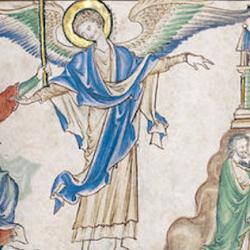The twenty-four uses of the verb “fall” (Greek pipto ) are distributed in an interesting way through the book of Revelation.
Initially, falling is an act of worship (1:17; 4:10; 5:8, 14; 7:11). Most of this falling is done in heaven (apart from John, 1:17). Through the next several chapters, heavenly things are falling to the earth – stars (6:13), including the star Wormwood (8:10) and an unnamed star that opens the abyss (9:2). On earth cities (16:19) and kings (17:10) fall, and finally Babylon herself falls (18:2; cf. 14:8).
Toward the middle of the book, there is a reminder of the liturgicl prostrations of the twenty-four elders (11:16), but falling in worship comes back in earnest after Babylon is fallen (19:4, 10; 22:8).
All things fall before the Lord. Some fall in voluntary worship, and some are dropped out of heaven. In Revelation, God elicits the prostrations of His people by making things fall from heaven. Falling in heaven leads to falling on earth when heaven is cleansed and heavenly things fall.













